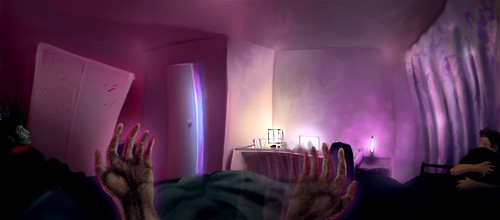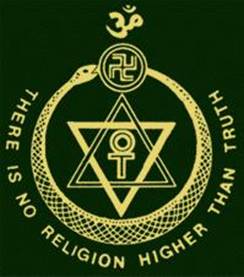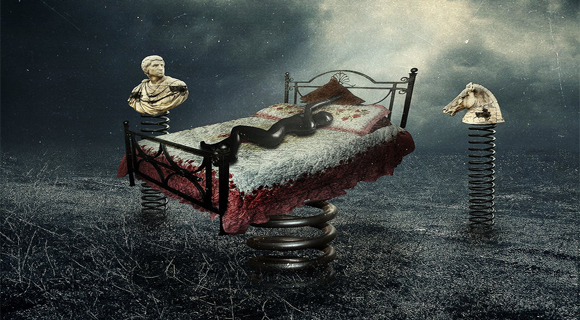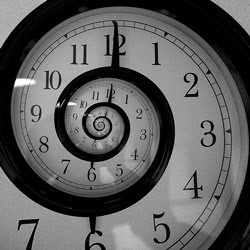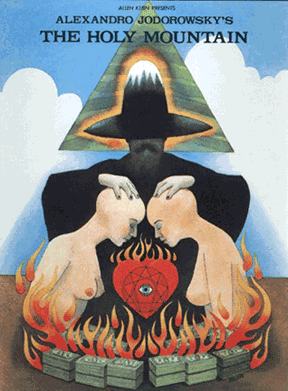[The following article was originally posted to my former blog, Left-Hand Path, in March of 2011. Though my understanding of astral projection and out of body experiences has evolved since that time, I still feel that it is worth sharing as I (perhaps inadvertently) touched upon several important concepts that have shaped my thinking in the years since.]
I first became aware of the concept of “exteriorization” while reading August Strindberg’s Inferno, an autobiographical novel which details the playwright’s involvement with the occult. During a bout of what he describes as “perverted affection,” Strindberg longs to be united with his wife (with whom he is going through a divorce) and their child. He decides that the best way to attain this goal is to perform a black magick ritual in which he curses the child to fall ill. “Small children are always falling ill for one reason or another,” he says.
Shortly afterward, Strindberg is informed by letter that his children from a different marriage have been admitted to the hospital. As a cautionary tale to the reader, he says the following:
In the spring, just at the time when I was so much oppressed by my own reverses as well as those of my companion, I had a letter from the children of my first marriage, telling me that they had been seriously ill and had had to go to hospital. When I compared the date they mentioned with the date of my experiment in bewitchment I was seized with horror. By playing with those mysterious powers, out of pure folly I had given the reins to my evil desires, but they, guided by the hand of the Unseen, had struck at my own heart.
I am not trying to excuse myself. I am only asking the reader to to bear these facts in mind, should he ever be tempted to practise magic, particularly the kind known as bewitchment, or witchcraft in the true sense of the word. De Rochas has shown this to be a reality.
Strindberg is referring to the French parapsychologist, Albert de Rochas, whose seminal work The Exteriorisation of Sensibility is cited in the book as a footnote at the end of the second paragraph quoted above. Despite a prolific career in the French military (at one point rising to the rank of battalion commander), de Rochas is most well known for his study of parapsychology and the occult, having dedicated his life to an attempt to interpret occult phenomena through the lens of empiricism. Among the concepts that de Rochas explored were hypnosis, telekinesis, reincarnation, past life regression, and the effect of music on human emotions.
It was through working with patients as a hypnotist that de Rochas documented the phenomenon he first described as “externalisation of sensibility,” meaning that the subject is able to sense stimuli at a distance, such as feeling pain if a certain spot is pinched away from the body.
It’s interesting to note that one of the core concepts of the Church of Scientology is a practice known as “exteriorization,” during which a human subject functions independently of the physical body as a thetan (which they define as “an aware of awareness unit”). Despite the bizarre language, this concept seems to be consistent with de Rochas’ findings.
The truth is that throughout all of history, occultists have realized that within the human animal, there exists an innate ability to “sense” objects and dimensions outside of the physical body. Our technology has developed to the point where this phenomenon can now be induced immediately through the use of chemical agents. That our senses expand far beyond the limits of our earthbound bodies is quite obvious, as the phenomenon of exteriorization is an intrinsic part of the human experience, but it is difficult to describe such events in words, as experiences outside of the body are far removed from the language of everyday reality, and therefore often go unnoticed.
If you get into these spaces at all, you must forget about them when you come back. You must forget you’re omnipotent and omniscient and take the game seriously so you’ll engage in sex, have children, and participate in the whole human scenario. When you come back from a deep LSD trip or a K trip — or coma or psychosis — there’s always this extraterrestrial feeling. You have to read the directions in the glove compartment so you can run the human vehicle once more. After I first took acid in the tank and traveled to distant dimensions, I cried when I came back and found myself trapped in a body. I didn’t even know whose body it was at first. It was the sadness of reentry.
– Dr. John C. Lilly
In waking life, one’s immediate consciousness seems to arise primarily through the senses of the physical body (of which we now know there are far more than 5). Typically, we think of these senses as being separate, but in reality, we are experiencing, or “sensing,” each of our physical and psychic senses simultaneously, coming together as a unified whole in the form of the present moment.
However, few would argue that the vessel through which one acts in the dream world (astral plane) is of the same manner as the biologically determined animal body in which he is imprisoned during his waking life. If not, then what is the nature of said astral body, and what is its relation to the concept of exteriorization?
In dreams, one often survives events that would immediately result in death during waking consciousness. Likewise, one often finds himself performing feats that defy the physical laws he had known previously. Nevertheless, this does not suggest that the astral plane is necessarily “non-physical.” Consciousness of astral realms (an exteriorization of the senses from our “physical” bodies, attained through dream and trance states) appears to be a mode of sensory perception different from the physical universe we identify with during our waking consciousness only in the sense of modified physical laws, rather than the absence of such.
We must consider the implications of unconscious psychic material within this framework. The psychoanalyst Sigmund Freud was the first to elaborate on the concept of the “unconscious mind,” which he said consists of active psychic material which is not permitted into our consciousness for one reason or another. To put it simply, the unconscious is anything that one is not consciously aware of at any given moment. The vast majority of our psychic activity resides within the unconscious. According to Freud, the physical laws of the universes one experiences through dream states are arranged in such a way that the unconscious is able to communicate symbolically with the conscious mind (and occasionally have direct communion).
Having determined that our immediate consciousness of the present moment is the totality of our perpetually active physical and psychic senses, we see that this has tremendous implications as to the scope of the unconscious. If, as we have seen, our senses are able to “exteriorize” themselves beyond our physical bodies and well into the myriad universes that manifest on the astral plane, it follows that the unconscious and the depth of one’s perception are boundless and potentially infinite.
This is an essential experience of any mystical realization. You die to your flesh and are born into your spirit. You identify with the consciousness and life of which your body is but the vehicle. You die to the vehicle and become identified in your consciousness with that of which the vehicle is but the carrier. That is the God. Behind all these manifestations is the one radiance, which shines through all things.
– Joseph Campbell

